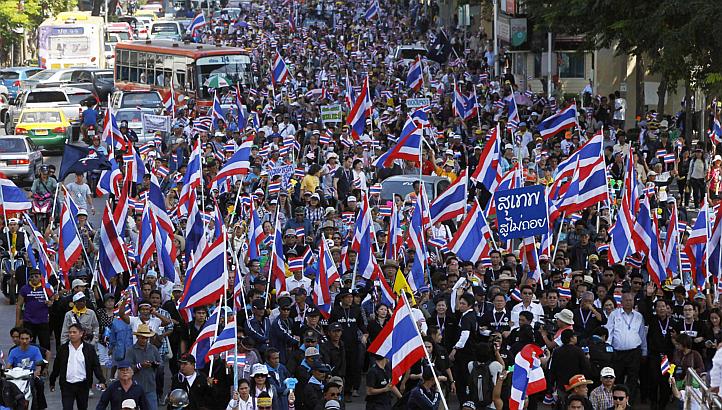
A multitude of protesters take to the streets of Bangkok, Thailand on Nov. 4, 2013 in opposition to an amnesty bill being considered by the country’s senate. If approved, some fear it could lead to deposed leader Thaksin Shinawatra avoiding jail time and regaining power. Photo: Reuters via Straits Times
Sadly, the adage “the more things change the more they stay the same” is perfectly to describe struggles in keeping strong democracy in Asia. Upon returning from hiatus, I started looking for story ideas and ran across some “updates” to items I had covered earlier this year. But in reality not much is different in Thailand and Maldives.
Thailand
Let’s pick up where I left off: My last article concerned controversial legislation in Thailand that critics worry will allow former Prime Minister Thaksin Shinawatra to return to the country. Thaksin was ousted in a 2006 military coup, and fled rather than face a 2-year prison sentence for corruption. An amnesty bill being considered by Thailand’s senate could absolve him of wrongdoing and nullify his sentence.
Thaksin opponents fear the amnesty bill, if passed, would pave the way for Thaksin to regain power. His supporters, including current Prime Minister Yingluck Shinawatra–Thaksin’s sister–claim the legislation is a genuine offer of reconciliation for past violence and an effort to resolve the conflict once and for all.
When I wrote about this controversy in August, just the talk of amnesty set off massive protests in Bangkok. A revised version which extended coverage to additional groups resulted in renewed protests last Friday, Nov. 1.
Yingluck has stated publicly that her government will not pursue the amnesty bill if the senate rejects it, though some question her veracity. Several groups both inside and outside of Thailand have vocally opposed it. The senate vote is scheduled for Monday, Nov. 11.
Maldives
I was saddened to discover that the plight of former Maldivian President Mohamed Nasheed drags on. In May 2013 I wrote of how he was arrested by political opponents, and it was unclear whether he would be considered as a candidate in the next presidential election. Recall that Nasheed became Maldives’ first democratically elected president in 2008, then was ousted in what he calls a coup in 2012.
The good news: Nasheed did in fact participate in the presidential election held on Sept. 7, 2013. He received the most votes. The bad news: Maldives supreme court declared the election results invalid due to claims of fraud and impropriety.
A revote had been scheduled to take place in October but the country’s police force canceled it, to the dismay of human right groups and foreign ministry leaders. A new/old election is set for Sat. Nov. 9.
Nasheed claims these undulations are purposeful moves to prevent him from regaining power (in Thailand they’re subverting democracy to bring someone back to power, in Maldives to prevent a democratically elected leader from returning). Among his opponents in the election is Yaamin Abdul Gayoom, brother of former dictator Nasheed Maumoon Gayoom, whose underlings tortured Nasheed.
***
Democracy seems to be losing in Thailand and Maldives. It is hard to establish when those in power are convinced they can keep it. It should be the responsibility of the global community to convince the powers that be that fairness and transparency are expected, if not demanded. While both countries are hardly international powers, this should not diminish the importance of their struggles for achieving a basic democratic ideal: every citizen deserves fair and honest leadership.